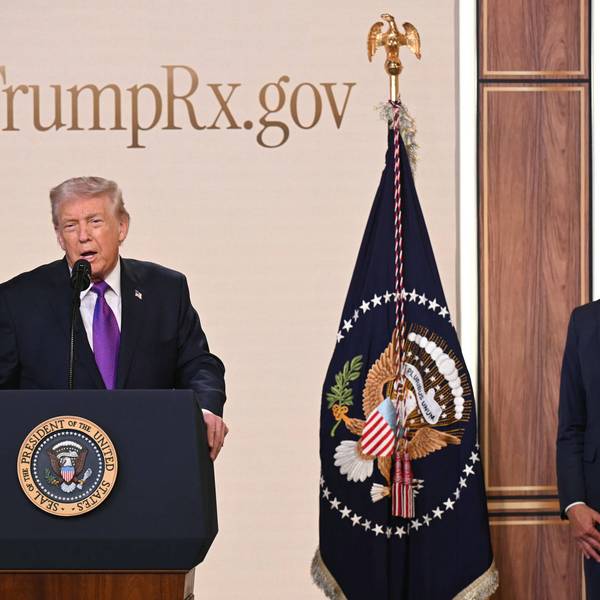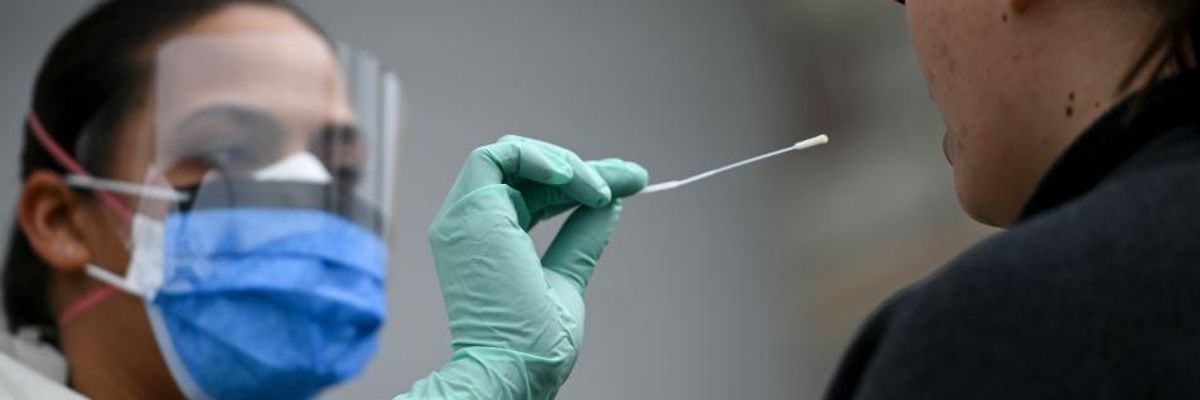A Gallup poll out Tuesday indicates that tens of millions of U.S. adults would avoid seeking potentially life-saving medical treatment for Covid-19 symptoms due to fears about their ability to afford the associated costs.
The survey results were viewed as an alarming though not surprising signal that America's uniquely expensive for-profit healthcare system--which has produced numerous horror stories of coronavirus patients being hit with massive surprise medical bills--could be forcing millions of people to forego medical care for the deadly and highly infectious virus.
"One out of every seven (14%) U.S. adults report that they would avoid seeking healthcare for a fever and a dry cough for themselves or a member of their household due to concerns about their ability to pay for it," Gallup found. "When framed explicitly as believing to have been infected by the novel coronavirus, 9% still report that they would avoid seeking care."
"At a time when many American families are waiting hours in food lines and are often unable to afford groceries, whatever amount of money is left in their pocket must be saved for the basic needs of their families, not exorbitant healthcare bills."
--Sen. Bernie Sanders
"Adults under 30, non-whites, those with a high school education or less, and those in households with incomes under $40,000 per year are the groups most likely to indicate they would avoid seeking out care," Gallup reported.
"This is terrifying," tweeted Bill Sweeney, senior vice president of government affairs with AARP Advocates.
Louise Aronson, a professor of medicine at the University of California, San Francisco, said on Twitter "a country that puts people in this situation is not a country upholding its responsibility to its citizens."
According to a study released earlier this month by America's Health Insurance Plans, an insurance industry trade group, the average cost of coronavirus treatment for patients admitted to intensive care could exceed $30,000.
The terror that U.S. medical costs have induced in coronavirus patients was vividly captured earlier in April by New York City registered nurse anesthetist Derrick Smith.
In a viral social media post and subsequent press interviews, Smith told the tragic story of a man dying of Covid-19 who asked, "Who's going to pay for it?" as he was placed on a ventilator. Smith said he does not know if the patient survived but believes it is "pretty unlikely."
"I was very sad and honestly, a little horrified," Smith told CNN. "This demonstrates that we have a profound failure when one has to worry about their finances when they're dealing with much bigger issues that have to do with life or death."
The multi-trillion-dollar CARES Act that President Donald Trump signed into law last month included provisions aimed at requiring private insurers to make Covid-19 testing free for customers, but people could still be hit with large bills if they are tested by an out-of-network entity. Some major insurers, including Cigna and Humana, have vowed to waive out-of-pocket coronavirus treatment costs.
As for the tens of millions of people in the U.S. without health insurance--a number that is growing rapidly as mass layoffs continue--the Trump administration has vowed to use an unspecified amount of hospital funds from the CARES Act to cover coronavirus treatment costs for the uninsured.
Progressives argue that more systematic solutions are necessary to ensure that everyone in the U.S. is able to receive the treatment they need, for coronavirus and other ailments, without worrying about the potential costs.
In an op-ed for Politico on Tuesday, Sen. Bernie Sanders (I-Vt.) made the case for his proposal to "empower Medicare to pay all of the healthcare costs for the uninsured, as well as all out-of-pocket expenses for those with existing public or private insurance, for as long as this pandemic continues."
The Health Care Emergency Guarantee Act, which Sanders introduced alongside Rep. Pramila Jayapal (D-Wash.) earlier this month, would provide "comprehensive coverage to far more Americans while saving taxpayers money," the Vermont senator wrote.
"At a time when many American families are waiting hours in food lines and are often unable to afford groceries, whatever amount of money is left in their pocket must be saved for the basic needs of their families, not exorbitant healthcare bills," said Sanders. "When so many of our people are struggling economically and are terrified by the possibility of becoming sick with the coronavirus, the government must take the burden of health care costs off the backs of working people."




